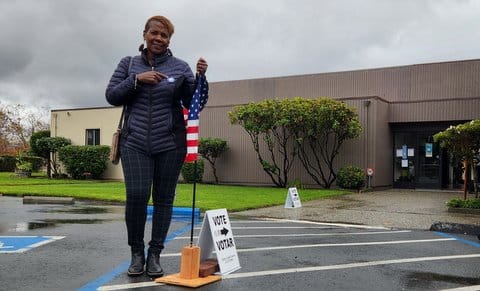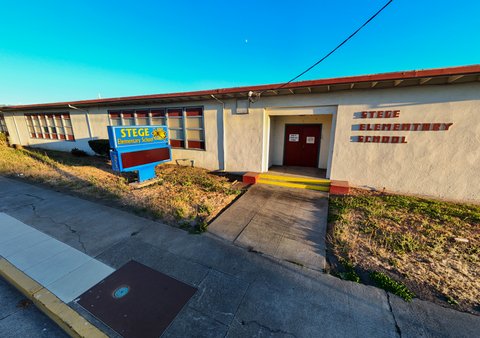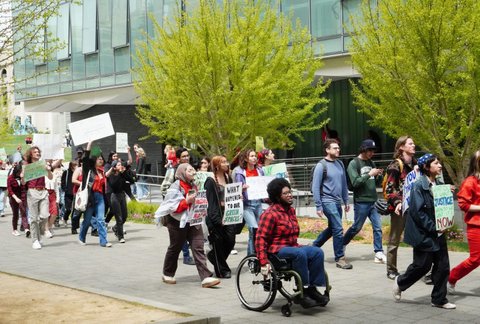
06 Mar California Super Tuesday Primary Results: Black Candidates for November Election Emerge

Joyce Redd stands outside Easter Hill United Methodist Church in Richmond after voting in the 2022 midterms. (Denis Perez-Bravo / CC Pulse file)
By Joe W. Bowers Jr. | California Black Media
On Super Tuesday, March 5, California presidential primary voters selected the candidates who will be on the November general election ballot for national and statewide offices, including the U.S. president, the U.S. Senate, 52 House of Representative seats, 80 State Assembly seats, and 20 Senate seats.
Additionally, voters are showing their support for Proposition 1, which authorizes $6.38 billion in bonds to build mental health treatment facilities. Currently, over 50% of the vote is in favor of the proposition.
The California “jungle” primary employs a top-two voting system for statewide offices, where the two candidates, regardless of party, with the highest votes even if one candidate receives a majority of all votes cast, proceed to the general election in November. Only candidates running for state superintendent of public instruction or candidates for voter-nominated offices in special elections can win outright by getting a majority of the vote (50% plus 1) in the primary election.
The state sent mail-in ballots to all 22 million registered voters. Voters could hand in their ballots at designated drop-off locations no later than 8 p.m. on Election Day. Or they could mail their ballots, with a postmark no later than March 5, and received by March 12, 2024.
Although African Americans comprise 6.5% of California’s population, Black candidates are contesting for 11.5% of California’s U.S. House seats, 23.8% of state Assembly seats and 30% of state Senate seats.
Fifty-three Black candidates participated in 32 of the 154 statewide elections. That’s about 21% of the races.
The party affiliations of the candidates include 42 Democrats, 7 Republicans, one Green Party, three Peace and Freedom Party, and one from the American Independent Party. Among these candidates, 27 women ran for office – one for president, one for U.S. Senate, 4 for Congress, 15 for state Assembly, and 7 for state Senate. There were 27 men on the ballot – 3 for president, 8 for Congress, 9 for state Assembly, and 7 for state Senate.
No Black candidate will be on the November ballot for president.
Rep. Barbara Lee, D-CA-12, the only Black candidate running for U.S. Senate (both full and partial term) to succeed U.S. Sen. Laphonza Butler, did not secure one of the two top spots. Because Democratic Rep. Adam Schiff and Republican Steve Garvey are the likely top two finishers, California will be without a woman contending to be a senator for the first time in more than 30 years.
In the Congressional elections, 12 Black candidates competed for 6 seats. Currently, five are in contention to be on the November ballot.
Kevin Lincoln (R), the mayor of Stockton, in the contest for Congressional District (CD) 9 (Stockton) is running second to the incumbent Congress member, Josh Harder (D).
In CD 12 (Oakland), in the race to succeed Barbara Lee, Lateefah Simon (D), a nonprofit foundation president, is currently leading the field.
Sydney Kamlager-Dove (D), one of the three current Black Congress members from California, is leading in her bid to continue to represent CD 37 (Los Angeles).
In the race to represent CD 43 (Los Angeles) two Black candidates will be on the November ballot. Incumbent representative Maxine Waters (D) will face Steve Williams (R), a small business owner.
If Lincoln wins, he will be the fourth Black Congressperson from California.
12 Black candidates ran for five of the 20 State Senate seats being contested in the primary. Three of those candidates are in contention to be on the November ballot.
In the race for SD 35 (Inglewood) to replace the term-limited Sen. Steven Bradford (D), Michelle Chambers (D), a community justice advocate and Laura Richardson (D) ), a former Congress member, businesswoman and housing advocate are leading the field of eight candidates.
Dr. Akilah Weber (D), an Assemblymember and medical doctor, is leading in the race to succeed Senate President pro Tempore for the SD 39 (San Diego) seat.
A win by Weber would increase the number of Black Senators to three. All three would be Black women.
24 Black candidates ran for 19 of the 80 Assembly seats. 11 are in contention to be on the ballot in November.
Porsche Middleton (D) is contesting to represent Assembly District (AD) 7 (Citrus Heights) and is running second to incumbent Josh Hoover (R).
In AD 11 (Suisun City), incumbent Assemblymember Lori D. Wilson (D) is leading a field of 4 candidates.
Rhodesia Ransom (D), a business owner and mother, is leading two other candidates to represent AD 13 (Stockton).
Incumbent Assemblymember Mia Bonta (D) is leading in her race to continue to represent AD 18 (Oakland).
Isaac G. Bryan (D), the incumbent Assemblymember for AD 55 (Ladera Heights), is leading in his race.
In AD 57 (Los Angeles), five candidates were running to replace Reggie Jones-Sawyer, who is term-limited. Sade Elhawary, an education and community organizer is in second place in the vote count
Corey A Jackson (D), the incumbent Assemblymember for AD 60 (Riverside) is leading all candidates and in November will be running against the other Black candidate in the race, Ron Edwards (R), a small business owner.
Tina Simone McKinnor (D), the incumbent Assemblymember for AD 61 (Inglewood) will be on the November ballot.
Mike Gipson (D), the incumbent Assemblymember for AD 65 (Compton), ran unopposed.
Dom Jones (D), a businesswoman and TV personality, is running second to incumbent Diane Dixon (R) to represent AD-72 (Huntington Beach).
Based on election results so far, the California Legislative Black Caucus will lose representatives in AD 6 (Sacramento), AD 41 (Pasadena), and AD 79 (La Mesa. AD 57 (Los Angeles) is in a precarious situation because the leading Black candidate is second in the vote count. However, votes were split with two other Black candidates. Because AD 7 (Citrus Heights) and AD 72 (Huntington Beach) are Republican-leaning districts, the Black candidates in contention are Democrats, making it an uphill battle for the CLBC to pick up the seats. U.S. AD 13 (Stockton) is a Democratic-leaning district and is a potential gain for CLBC because the Black candidate is leading the vote count.
Any results posted on election night are considered semi-official, and a complete tally of votes won’t be completed on Election Day. Counties have 30 days to complete that canvass.
The Secretary of State is required to certify the results 38 days after the election. Results will be certified by April 12, 2024.





No Comments